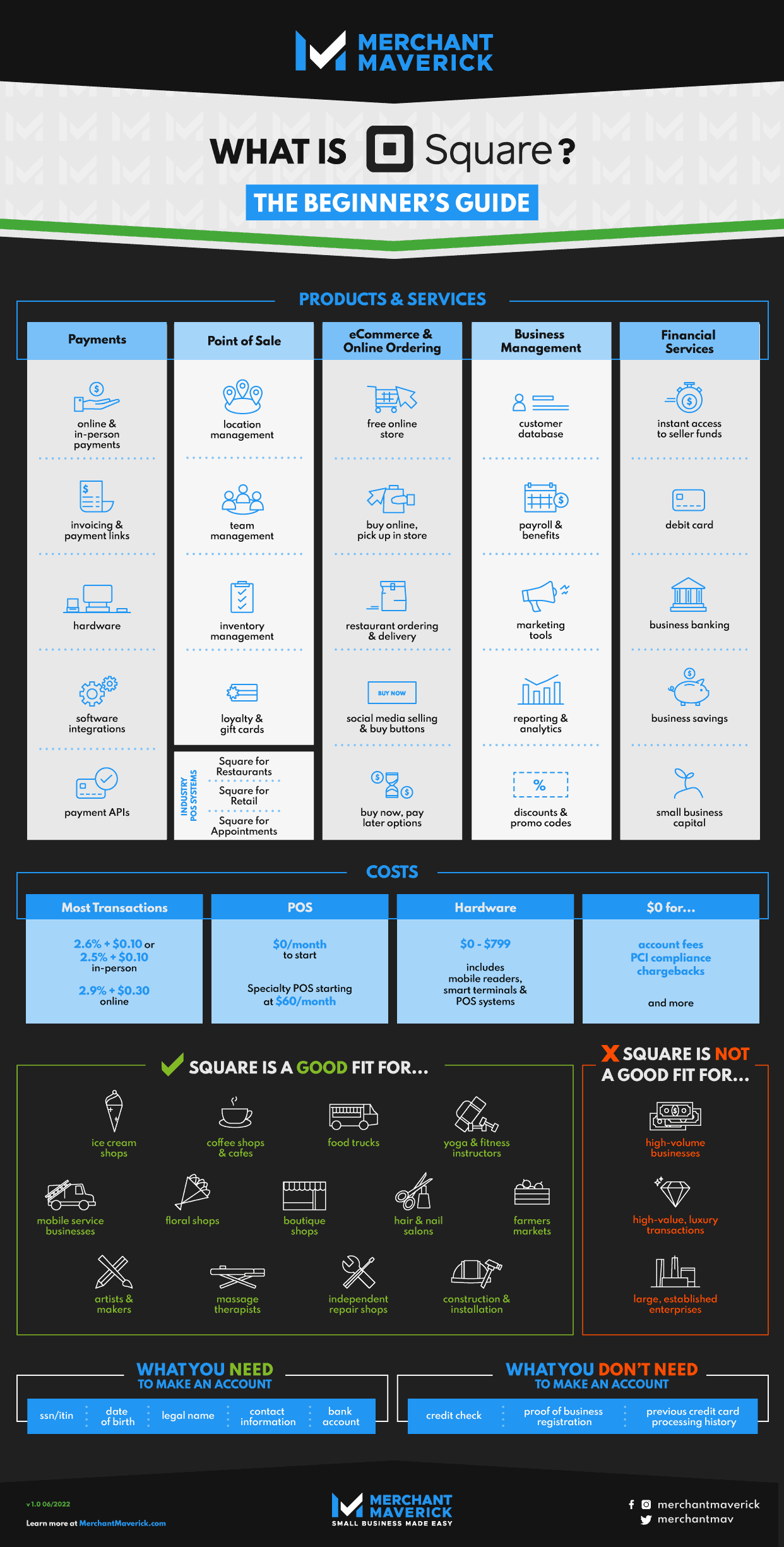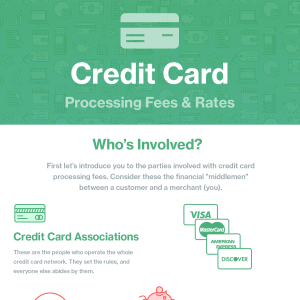What is Square and how does it work for your small business? Read this guide to find out about pricing, integrations, how to set up a Square account, and more.
Our content reflects the editorial opinions of our experts. While our site makes money through
referral partnerships, we only partner with companies that meet our standards for quality, as outlined in our independent
rating and scoring system.
Square’s business model is to be many things to many different types of businesses, but at its core, it is a solution to help businesses manage how they process payments from transactions both online and in-person. It is one of the best credit card processing companies for small businesses available.
In this post, we’ll answer all of your most basic questions about Square for small businesses, including how Square works.
What Is Square?
Square is a company that provides payment processing, point of sale software, and a variety of other services to small businesses. It prides itself on its ease of use and affordability as an all-in-one system for retail shops and restaurant owners.
Think of Square as a credit card processing service that makes it easy for businesses to start accepting card and mobile payments. Merchants can use Square to take mobile credit card payments from their customers and create a seamless selling process from anywhere. Square’s services also include point of sale, inventory, and employee management.
How Does Square Work?
When businesses use traditional merchant accounts, card payments for goods and services temporarily go into a private merchant account for deposit. Square, on the other hand, pools all of its subscribing users’ accounts into one big merchant account, which makes it a third-party payment processor. With Square, businesses don’t need to wait for banks to process fees on deposited funds while the merchant account provider holds onto them.
Square is not just about payment processing, though. Square’s free POS app helps with day-to-day business management, and there are loyalty and payroll apps as well. The Square Cash App was designed to compete with similar services like Venmo. Square Cash App is a peer-to-peer payment service allowing customers to easily pay for products and services from their mobile devices while taking a small fee.
How Much Does Square Cost?
Square’s rates at a glance vary by the type of transactions businesses are processing. Without breaking out a calculator and crunching numbers, here’s a look at how much Square charges:
- Card-Present Fee For Square For Retail Plus & Square Appointments: 2.5% + $0.10
- Standard Card-Present Fee: 2.6% + $0.10
- Online & Invoiced Transactions: 2.9% + $0.30
- Manually Keyed-In Transactions: 3.5% + $0.15
Per-transaction rates and fees aren’t exactly attractive all on their own to small businesses. Square promises no monthly fees, statement fees, or minimums to help growing businesses remain flexible.
Square’s more advanced software tiers, like Square for Restaurants, Square for Retail, and Square Appointments, all have free entry points. Square for Restaurants and Retail start at $60/month for their paid levels, and Appointments starts at $29/month per location.
In addition, Square has excellent hardware options. There is a free strip reader for basic payments and a chip reader for $59. Square Terminal, Square’s mobile payment processor, costs $299, and Square Register, an all-in-one POS and processing system, starts at $799. Square’s latest hardware addition, the mobile Square Handheld, goes for $399.
What Does Square Do? A Quick Guide To Square Products & Services
Open this infographic in a popup!
Square has become much more than just a swipe-based smartphone processing system. The Square business model has evolved, and features like a robust mobile POS app, payroll, inventory and employee management, online store, and email marketing have all come together under Square’s umbrella of business-centric services.
There’s a lot to cover when it comes to Square services. In general, though, the list below introduces the product’s core features:
Payments
- Online & In-Person Payments: You can dip, tap, or swipe cards, scan with Apple Pay and Google Pay, and use Cash App through your POS. You can also take payments over the phone by keying in the credit card number using the Square app or on the Square Dashboard of your computer.
- Invoicing & Payment Links: Square Invoices allows you to send invoices and estimates, plus accept payments and send reminders while tracking your paid and unpaid invoices.
- Hardware: Square has excellent hardware options and bundles, starting with its free stripe reader. It also offers chip readers, iPad stands, Square Terminal, a mobile card processor, and Square Register, an all-in-one processor and POS system.
- Software Integrations: The Square Marketplace gives you access to hundreds of valuable software apps for accounting, loyalty, online ordering, and more to help your small business run smoothly.
- Payment APIs: All of Square’s APIs are free for developers to use to help customize their own system.
Point Of Sale
- Location Management: You can manage multiple locations and franchises with Square with the touch of a button and handle inventory transfers between them.
- Team Management: Square makes it easy to create schedules for your employees and manage shifts. You can also handle permissions through its employee management system and track performance.
- Inventory Management: Square has strong inventory management with things like low stock alerts, downloadable reports, and purchase order management, which can help you track and ship management between locations.
- Loyalty & Gift Cards: Through Square, you can purchase their built-in loyalty and gift card program to help incentivize customers to return and spend more at your business.
- Square Software Plans: If you’re looking for more niche or in-depth features, Square has specific products just for you. You can sign up for Square for Retail, Square for Restaurants, or Square Appointments, all of which have a free plan and a subscription plan, depending on your needs.
eCommerce & Online Ordering
- Free Online Store: One of the biggest perks of Square is that it offers a free online store that is quick to set up and allows you to create your own website for eCommerce selling in just minutes.
- Buy Online, Pick Up Instore: Along those lines, with Square’s eCommerce options, your customers can make purchases through your website and have the product conveniently waiting for them to pick up at their desired location.
- Restaurant Ordering & Delivery: A crucial part of owning a restaurant these days is the option to provide pickup and delivery to increase your customer base. Square offers excellent mobile ordering and delivery options to help you add this option to your establishment and increase profits.
- Social Media Selling & Buy Buttons: Through Square, you can also sell directly through your social media platform. The ability to add buy buttons directly to your Facebook or Instagram page is another way to instantly reach customers.
- Buy Now, Pay Later Options: Another popular option for customers is the ability to purchase a product and pay at a later date and Square has this capability built-in as well.
Business Management
- Customer Database: Square’s marketing tools allow you to create a database to store customer information for payments, campaigns, and newsletters.
- Payroll & Benefits: As all-in-one business software, Square also offers Square Payroll, allowing you to get your employees paid on time and accurately. This also comes with HR and benefits support to take one more task off your plate.
- Marketing Tools: Along with its customer database, Square comes with tools to help you get your business and products seen through social media platforms and through tailored email campaigns, giving you the option to set up coupons and promotions.
- Reporting & Analytics: Square has a deep list of reports that can help you analyze the performance of employees or certain products to keep you running at peak productivity.
- Discounts & Promo Codes: If you’re planning on running plenty of sales or promotions, Square has you covered here as well. Square makes it easy to discount items and run things like happy hour specials to further entice customers.
Financial Services
- Instant Access To Seller Funds: Square makes it easy to access your money, allowing an unlimited number of instant transfers per day of up to $10,000 per transfer.
- Debit Card: With a Square checking account, you can also obtain a Square debit card that gives you instant access to your Square funds that comes with no monthly fee.
- Business Banking: Create your own business checking account through Square, giving you an added level of security and a way to better track your money with no monthly fees.
- Business Savings: Just like your checking account, you can set up a business savings account through Square as well, earning interest with an account that is linked to your Square Payments account.
- Small Business Capital: Need a loan to get started or expand your business? Square has you covered there as well, offering competitive rates and an easy approval process with the Square Capital program.
Hardware Offerings
- Square Reader: Square gives a free magstripe reader to new customers and also sells its Square reader for contactless and chip payments for $59.
- Square Stand: The Square Stand comes with integrated payments and everything you need to operate your point of sale system from an iPad. It’s small, sleek, and user-friendly for customers — and all for $149.
- Square Terminal: This mobile payment processing device is great for tableside ordering or busy retail shops. Square Terminal accepts all forms of payments, runs most Square software, and features a built-in receipt printer. Square Terminal retails for $299 on Square’s website.
- Square Register: This all-in-one point of sale system features two displays for customers and has built-in payments. It is also compatible with all of Square’s software. Square Register has an intuitive interface and takes just minutes to have up and running.
Is Square Good For Small Businesses?
Square offers an all-in-one system for small businesses, including payment processing, point of sale, software, hardware options, and a unique app store, all for upfront, affordable pricing.
For newer small business owners or ones who are looking to simplify their day-to-day operations, Square is a simple option that is highly scalable with no long-term contracts to worry about. It comes with strong customer service and is extremely well-reviewed.
Advantages Of Using Square
- Free POS solution: Square Point of Sale is a household name in mobile card payment processing and is a reliable solution that instantly integrates with businesses’ payment processing solutions without stacking on fees or hidden contract clauses.
- Hybrid payment processing: This makes it simpler for up-and-coming businesses to let customers browse online and pay in person. Square accommodates merchants in niche industries, online retailers, and micro-merchants who need payment processing solutions that don’t interrupt their customers’ purchasing experience.
- Transparent pricing: Square has no monthly fees or statements attached. One of Square’s biggest draws is its pricing structure, one that stands in stark contrast to the typical sign-up and application processes that traditional merchant providers require.
Disadvantages Of Using Square
- Lost or incomplete sales: These can occur with keyed-in credit card processing attempts that get rejected. Businesses run the risk of losing out on funds that never get successfully processed by Square, which is an implicit disadvantage to using any third-party processor.
- Limited feature set: Some small businesses may need specialized payment processing solutions, and for many higher functions, Square requires a paid subscription.
- Indefinite funding holds: Although the risk of this occurring is small, Square, like most other third-party processors, is able to investigate, freeze, and terminate the funds they process as they see fit. It’s most likely for higher-volume merchants or high-risk businesses to experience issues with funding holds and investigations; these businesses may want to consider other, more premium payment processing solutions instead.
How To Open A Square Account
Small business owners who are ready to use Square to process payments can get started by providing a minimal amount of personal info and zero bank statements or proof of revenue. The free POS app and mag stripe mobile credit card reader come ready for use after a business creates a new account.
The entire process takes 10 minutes to get started at the most, and there is no credit check or upfront fees to get started. After your account is up, you are ready to start accepting payments immediately. And if you’re still on the fence, Square offers a 30-day free trial to test its software.
Here is the quick process for setting up your free account:
- Go to squareup.com and select Get Started
- Select your business type
- Enter your name, social security number, US-based bank account, date of birth, and mailing address. You also have the option to enter your employee identification number and your business bank account
- Enter your phone number or email address to receive a link
- Tap the link to download the app to your mobile device
Read more about how to set up a Square account.
Is Square The Best Choice For Small Businesses?
Square offers merchants a value that’s hard to beat, especially considering the fact that it’s a third-party processor that lets businesses start using it for free. With Square for small businesses, a wide range of services allows for flexibility when accepting online and in-person transactions, which is why it’s no wonder Square has thrived on more than just its reputation for reliable mobile card payment processing.
When it comes to ease of use, affordable pricing, and a feature set that makes it simpler to create an eCommerce presence, Square is pretty tough to beat. Square may not be the right solution for businesses of all types and sizes, especially larger ones that may need a more advanced portfolio of service and pricing tiers, and there are great alternatives to Square, but it provides enough support to make it stand head and shoulders above the competition.













